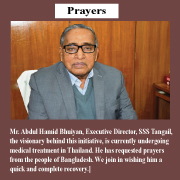Microfinance is not a burden, It’s a tool: SHARP,Mahbub Alam


Holiday Post Report: Mahbub Alam, Chief Executive of Self-Help & Rehabilitation Program (SHARP), recently sat with Holiday Post and spoke bluntly about the microfinance sector in Bangladesh. He sounded calm, confident, and concerned—firm on impact, but grounded in reality. said Mahbub Alam, Executive Director, SHARP. Recently he spokes with Holiday Post about the sustainability of MFIs, the current government’s policies, and regulations.
“Look, microfinance plays a big role in fighting poverty, empowering women, and helping people build small businesses. But it’s more than just handing out loans. It’s about how that loan changes a life,” he began.
He didn’t sugarcoat the challenges either. “First off, we don’t have enough technical skills, and our borrowers often lack digital literacy. That slows us down.”
He pointed out how borrowing money for microfinance is getting expensive. “Many MFIs take loans from commercial banks at high interest. We pass that cost to poor borrowers. That’s unfair.”
Then there’s the issue of multiple loans. “One person is borrowing from three or four MFIs. They can’t pay them back. And who gets blamed? The sector.”
Mahbub also criticized tight regulations. “When the MRA or Bangladesh Bank imposes rules that don’t fit the ground reality, it becomes hard for small MFIs to survive. At the same time, too many players—MFIs, NGOs, mobile money apps—all chase the same group of people. That’s creating chaos.”
He stressed how natural disasters and climate change are hitting borrowers hard. “If a farmer loses his crop in a flood, how can he repay the loan?”
According to him, the sector also struggles with measuring real impact. “Donors want to see social or environmental results, but many MFIs can’t prove them.” So what’s the fix?
Mahbub was clear: “We need stronger digital MFIs, better risk management, and more coordination with banks. And if women don’t have collateral, give them access to guarantee funds. Don’t just talk inclusion—act on it.”
On government policies, he was partly optimistic. “Yes, we see more transparency and accountability now. But when regulation becomes too much, it stifles innovation.”
He urged for a national sustainable microfinance policy. “It must support climate-friendly loans, women-friendly terms, and digital tools for the marginalized. Give subsidies for solar, biogas, or smart agri-tech. Use platforms like IDCOL or PKSF.”
What stood out most was his strong focus on responsibility. “We don’t just give loans. We train people, study their lifestyle, help them build income-generating activities. Every cost is shared upfront, receipts and messages go straight to the borrower’s mobile. Our repayment rate is 98.8%—that says something.”
Mahbub sees microfinance as a platform, not just a loan agency. “We’re planning AI-based credit scoring, faster disaster relief loans, and more loan-plus-training models.”
His vision is clear: “Loans should come with advice. Otherwise, people get stuck. But if you show them how to grow, they become entrepreneurs. The goal isn’t profit—it’s impact.”
He emphasized how branding MFIs as social platforms earns them more trust. “Customers need dignity, not just credit. Give them respect, and they’ll give you loyalty.”
As the conversation wrapped, he put it simply: “Microfinance is not a burden. It’s a bridge. It pulls people out of poverty and pushes them toward self-reliance. But only if we stop thinking of it as money—and start thinking of it as transformation.”





